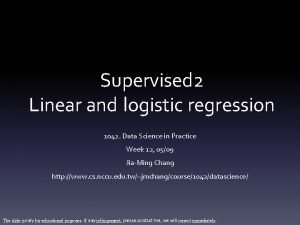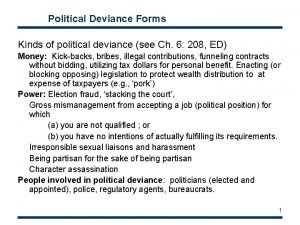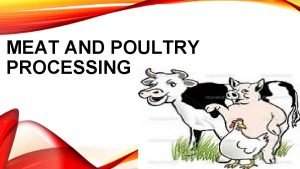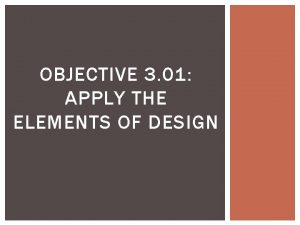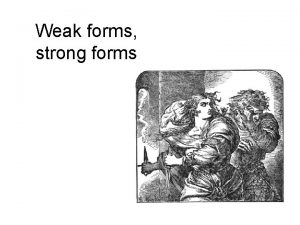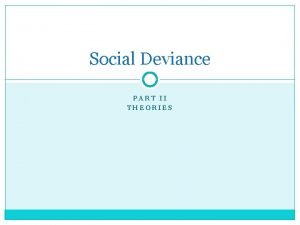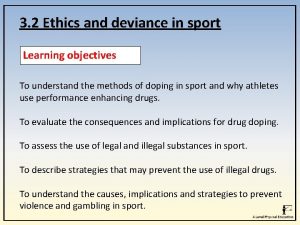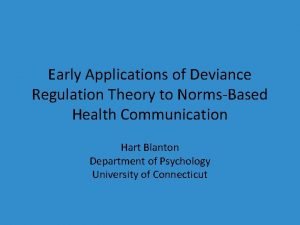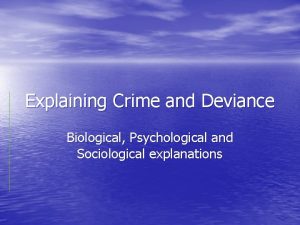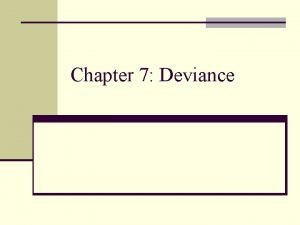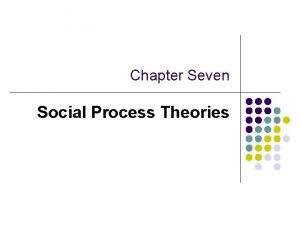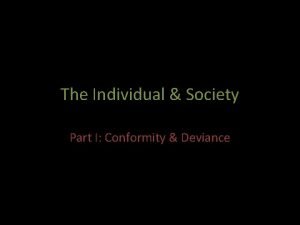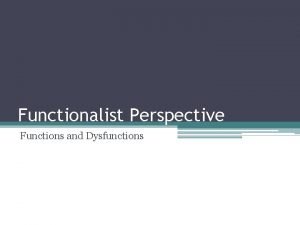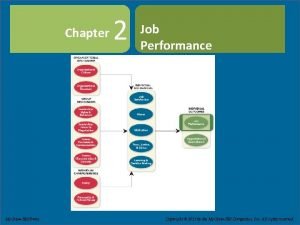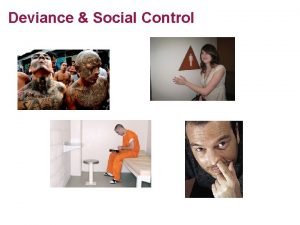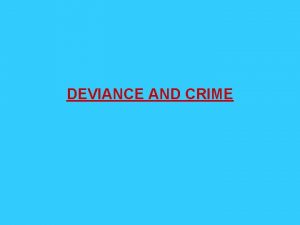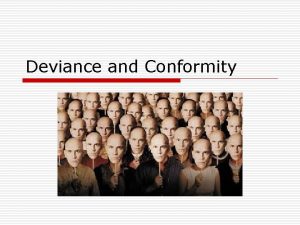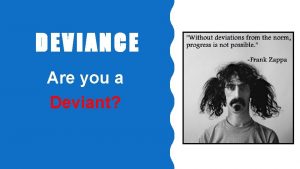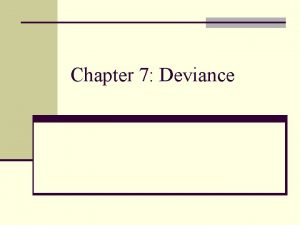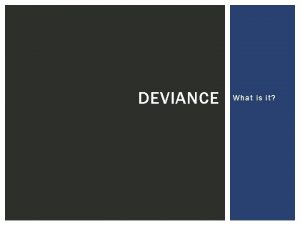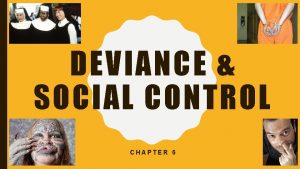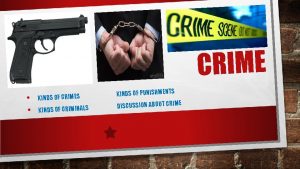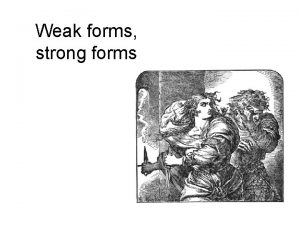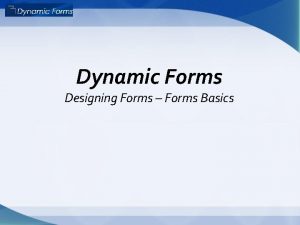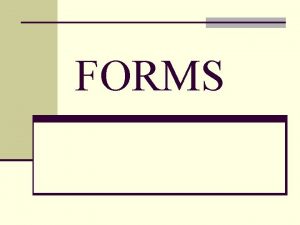Political Deviance Forms Kinds of political deviance see



















- Slides: 19

Political Deviance Forms Kinds of political deviance (see Ch. 6: 208, ED) Money: Kick-backs, bribes, illegal contributions, funneling contracts without bidding, utilizing tax dollars for personal benefit. Enacting (or blocking opposing) legislation to protect wealth distribution to at expense of taxpayers (e. g. , ‘pork’) Power: Election fraud, ‘stacking the court’, Gross mismanagement from accepting a job (political position) for which (a) you are not qualified ; or (b) you have no intentions of actually fulfilling its requirements. Irresponsible sexual liaisons and harassment Being partisan for the sake of being partisan Character assassination People involved in political deviance: politicians (elected and appointed), police, regulatory agents, bureaucrats. 1

Political Deviance Why is there political deviance? Each one of theories of deviance contributes a portion to our understanding. – Anomie – Social Control – Differential Association – Social Disorganization – Symbolic crusades – Control Theory – Functionalism But is that all there is? 2

Political Deviance A suggested overall process: where does it all start? External control of rules, laws. No Internal control: sense of entitlement No Protect power, Feed greed Learn from others Understand one’s status in society Neutralizations Take action 3

Political Deviance Cultural Origins – See Simon, ch 6. ‘What you see is where I’ve been’ § “Founding Fathers” were the most wealthy and powerful, and designed the new government to protect their interests. § Slaves were ¾ person – not total, because of racism, but given personhood so that slave-owning states had access to more power. Indians were given personhood only if they paid taxes, which benefited eastern states over frontier. § Women had no rights. § Fundamental protection of property rights. § Electoral college delegation process designed to prevent voice of people. 4

Political Deviance Look at the pattern… § Leaders are powerful people § Powerful people tend to have wealth. § So the purpose of the power tends to be to preserve and enhance wealth, rather than using the money for public good. See ED, Ch 6: pg 231 § Examine Simon’s ‘myths’ (pg 247 -248) § The antidote: – Making political power as accessible as possible to people. – Structural control to minimize risk for political deviance. § ‘Let them eat cake’ example. 5

Political Deviance The importance of structure 1. Checks and balances for power and its institutions 2. Regulatory bodies 3. Authority with responsibility The importance of a free press 1. Investigates improprieties (no one else does unless there’s a charge of a crime, and there almost never is). 2. But is increasingly run by profit-making goals more so than the desire to put out a quality newspaper with quality journalism. 3. Dumbing down of American media. 6

Political Deviance – 9/11 Symposium How did the mission of ‘not assigning individual blame’ have an impact on the report’s conclusions? 7

Political Deviance – 9/11 Symposium Perrow By ignoring individual contributions from non-governmental actors, or low-level actors, the Report diminishes potential for local control and instead seeks massive centralized organizational control. Differences between Clinton and Bush Administrations: A. Clinton, even though distracted by sex scandal, still acted to prevent terrorism. Despite ‘wall’ between FBI and CIA, Clinton managed to get cooperation. But he let the organizational challenges unaddressed. B. Bush, did not address org issues either, and also did not stray from his preconceived notions despite far more credible info regarding imminent terrorism threats. 8

Political Deviance – 9/11 Symposium Tierney The conclusions of the Report relied on a current theme of ‘controlling the people’ rather than ‘empowering the people’. Therefore, wants a militaristic solution, meaning that the way to protect our freedom is to remove it. 9

Governmental Deviance § Historical Sociology – Understanding deviance, and especially governmental deviance, requires methods of historical sociology, where historical events, facts and conditions, value systems, etc. become data. – The value of this form of research is to avoid being doomed to repeat history. – Remember to read history from different sides of the conflicts. 10

Governmental Deviance Possible Forms of Government Deviance § Government mistreatment of its own population – Fails to perform because of corruption (security, public health, economy, human/civil rights) – Scapegoats minority group and causes harm for power consolidation. – Bankrupts country’s assets for personal benefit. § Government oppression with respect to other populations – – – Non-defensive wars for conquest Genocide and mass murder Probably colonialism and imperialism and certainly in its consequences Slavery and slave trade. Assassinations and other manipulations of other governments. Standing by – or creating a context for others to commit acts of violence. 11

Governmental Deviance § Key elements from our theory which are definitional criteria: – GDev is dysfunctional – it benefits one group at expense of others. – It utilizes symbolic crusades as a way to get societal buy-in – Needs physical control practice to enforce – Utilizes an ideology that scapegoats and feeds off fear, with the Big Lie. – Uses labeling – Organized deviance – political leaders collude with those they know, based on their own experiences. (diff. assoc). – Requires support of military-industry (or economic leaders) 12

Governmental Deviance § Often overlaps with political deviance forms (see slide 100) § Difficult to control – Legal definitions lacking – Citizens of world have limited court/police with which to pursue justice. § UN and other similar bodies lack adequate legitimacy. – Legitimacy: when the people give a leader authority to rule. • • Coercive (sometimes part of Legal-Rational or others) Legal-Rational Traditional Charismatic – Hegemony – sphere of influence or control • Ideological hegemony – control of ideas and values, and therefore dominant parties seek control of information. 13

Governmental Deviance – Pol Pot & Cambodia From Wikipedia (http: //en. wikipedia. org/wiki/Pol_pot) § § Cambodia was French Colony. After independence in 1954, run by King Norodom Sihanouk, who played the parties against each other while using the police and army to suppress extreme political groups. Corrupt elections in 1955 led many leftists in Cambodia to abandon hope of taking power by legal means. The communist movement, while ideologically committed to armed struggle in these circumstances, did not launch a rebellion because of the weakness of the party. Pol Pot became leader when competition was arrested by Sihanouk. He then got support from Vietnamese communist party, and the movement took hold after another round of repression by Sihanouk in 1965. Vietnamese began utilizing Cambodian territory. By summer of 1968, Pol Pot’s power base was considerably larger and more influential. With more help from Vietnamese, mobilized Khmer Rouge into solid force of irregulars (read: not trained). The theme used by Pol Pot was one of a combination of leftist politics, antiintellectualism. 14

GDev- Pol Pot continued § The city people were considered almost a disease that needed to be contained so that it not infect the areas run by the Khmer Rouge. § He also ordered a series of general purges. Former government officials and anyone with an education was singled out in the purges. § A set of new prisons was constructed in Khmer Rouge run areas. § The Cham minority attempted an uprising around this time against attempts to destroy their culture. While the uprising was quickly crushed, Pol Pot ordered that harsh physical torture be used against most of those involved in the revolt. § Pol Pot tested out harsh new policies against the Cham minority before extending them to the general population of the country. § Internationally, Pol Pot and the Khmer Rouge were able to gain the recognition of 63 countries as the true government of Cambodia. A move was made at the United Nations to give the seat for Cambodia to the Khmer Rouge. The government prevailed by two votes. 15

GDev- Pol Pot continued § Out of a population of approximately 8 million, Pol Pot's regime exterminated one quarter, or almost 2 million people. § The Khmer Rouge targeted Buddhist monks, Westerneducated intellectuals, educated people in general, people who had contact with Western countries, people who appeared to be intelligent (for example, individuals with glasses), the crippled and lame, and ethnic minorities like ethnic Chinese, Laotians and Vietnamese. § Some were thrown into the infamous S-21 camp for interrogation involving torture in cases where a confession was useful to the government. Many others were subject to summary execution. 16

US Involvement in Iraq – is it Governmental Deviance? § First, let’s look at the criteria and evidence indicators. § Second, evaluate: – Saddam-Al Qaida link: Hussein had coercive legitimacy with a hegemonic platform that was secular. The country was modern to a large degree and progressive in many ways. Al Qaida is populist, and religious-based. Their power bases are at odds with each other. – No history of democratic process – Nation-building doesn’t ‘just happen’. – Influence of colonialism endures (French and British) – Ethnicity plays a central role in Middle East, and does so differently than it does in the West. § Thus, even excluding the WMD arguments, the war effort was likely to cause exactly the outcome we see. And, as for the WMD claims, which are now shown to be false, and with Libby’s conviction, we can see the anomie ‘ends justify means’ neutralizations, where the end itself is problematic: blind support for the Administration, regardless of conflicting facts. 17

Gov Deviance – War in Iraq? § Yes – – – § The Big Lie: (5 mistruths about war justification) Labeling of opposition Political assassination of opposition. Caused massive death and destruction. Created instability with long-term dangerous consequences. Redirected finite resources to a no-win situation instead of taking care of domestic population Ignored credible warnings re: 9/11 and then pursues non-9/11 country. Invokes symbolic crusades and demonizes enemies. Led to loss of civil liberties and abuses of power domestically. Tremendous profit going to limited companies, all associates of the Administration’s power base. Created outside of legitimate processes by limited set of long-term associates. No – – – Hussein was a ruthless dictator. Oil critical to national well-being. Hussein wanted to trade in another currency, not dollars. Hussein was a proven aggressor in the region. The Democrats almost all voted for it, too (which could mean they too are guilty of this deviance). 18

Governmental Deviance § Relating this to your final paper: – Look at the morality essays: essentially each one is a more involved version of what I expect in the final paper. Note their outline: Discusses importance, highlights interesting aspects of book (summarizes), and then explains them sociologically (usually through framing and labeling). Then the essayist adds his/her own perspective about the implications of the book and the subject matter in question. 19
 Logistic regression residual deviance
Logistic regression residual deviance Political deviance
Political deviance Identify correctly the market forms of meat
Identify correctly the market forms of meat Types of water forms
Types of water forms Contracted short forms
Contracted short forms Why are related forms more agreeable than unrelated forms
Why are related forms more agreeable than unrelated forms Why are related forms more agreeable than unrelated forms?
Why are related forms more agreeable than unrelated forms? Why are related forms more agreeable than unrelated forms?
Why are related forms more agreeable than unrelated forms? Strong forms
Strong forms Inner and outer controls work against deviance
Inner and outer controls work against deviance Deviance in sport
Deviance in sport Theory of deviance
Theory of deviance Deviance regulation theory
Deviance regulation theory Biological explanation of deviance
Biological explanation of deviance Involver behavior
Involver behavior Primary vs secondary deviance
Primary vs secondary deviance Example of strain theory
Example of strain theory Chapter 7 deviance crime and social control
Chapter 7 deviance crime and social control Dysfunctions of deviance
Dysfunctions of deviance Employee behaviors that intentionally hinder organizations
Employee behaviors that intentionally hinder organizations
